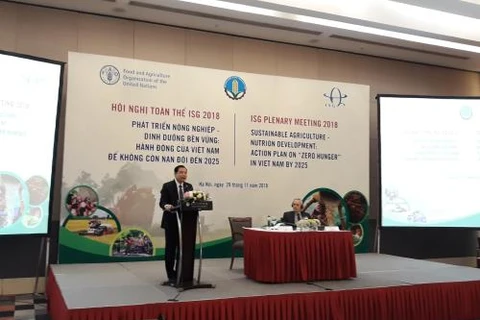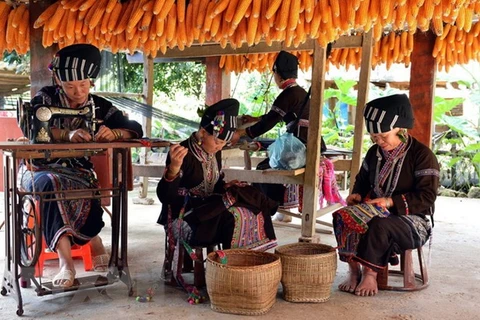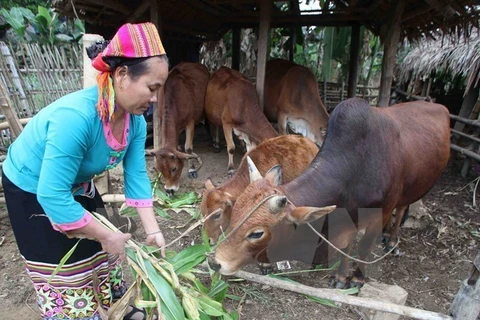Hanoi (VNA) – About six million Vietnamese people escaped from poverty between 2012-2016, with the poverty ratio dropping from 15.9 to 9.1 percent during the period, according to a report released on December 19.
The report – conducted by the United Nations Development Programme (UNDP) in Vietnam, the Ministry of Labour, Invalids, and Social Affairs, and the Vietnam Academy of Social Sciences – highlights the impressive progress Vietnam has made in implementing the Sustainable Development Goal (SDG) No.1 on poverty reduction.
It held that of the 17 SDGs targeted for 2030, goal number one is the most accessible in Vietnam. Poverty reduction achievements also brought the country to 57th out of 193 UN members in SDG indicators in 2018, up nine positions compared to 2017.
Realising the role of other factors outside of income that impact on people’s living quality, in 2015, the Government issued the multidimensional poverty standards. This was an important step in transforming the measurement of poverty levels based on income to assessing a multitude of factors, placing Vietnam at the forefront in the Asia-Pacific region in terms of applying such a method.
However, poverty still haunts many areas, especially in regions highly populated by ethnic minority groups. The multidimensional poverty ratio in the northern mountainous and Central Highlands regions is two times higher than the average ratio of the country.
In 2016, the ratio of those living in poverty within the Kinh community was 6.4 percent, while that in many ethnic minority groups is much higher, especially in the H’Mong group at 76.2 percent; Dao, 37.5 percent; and Khmer, 23.7 percent, said the report.
The gap in spending, income, education, and sanitary toilet access between the Kinh group and minority groups expanded in the 2012-2016 period, the report said, adding that poor households with disabled family members have less access to education and employment compared to the rest of society.
Caitlin Wiesen, UNDP Acting Country Director in Vietnam, held that whether Vietnam becomes successful in poverty reduction or not largely depends on the country’s capacity to ensure inclusive growth and create better employment opportunities for people and effectively support those who are at risk of being left behind. –VNA
The report – conducted by the United Nations Development Programme (UNDP) in Vietnam, the Ministry of Labour, Invalids, and Social Affairs, and the Vietnam Academy of Social Sciences – highlights the impressive progress Vietnam has made in implementing the Sustainable Development Goal (SDG) No.1 on poverty reduction.
It held that of the 17 SDGs targeted for 2030, goal number one is the most accessible in Vietnam. Poverty reduction achievements also brought the country to 57th out of 193 UN members in SDG indicators in 2018, up nine positions compared to 2017.
Realising the role of other factors outside of income that impact on people’s living quality, in 2015, the Government issued the multidimensional poverty standards. This was an important step in transforming the measurement of poverty levels based on income to assessing a multitude of factors, placing Vietnam at the forefront in the Asia-Pacific region in terms of applying such a method.
However, poverty still haunts many areas, especially in regions highly populated by ethnic minority groups. The multidimensional poverty ratio in the northern mountainous and Central Highlands regions is two times higher than the average ratio of the country.
In 2016, the ratio of those living in poverty within the Kinh community was 6.4 percent, while that in many ethnic minority groups is much higher, especially in the H’Mong group at 76.2 percent; Dao, 37.5 percent; and Khmer, 23.7 percent, said the report.
The gap in spending, income, education, and sanitary toilet access between the Kinh group and minority groups expanded in the 2012-2016 period, the report said, adding that poor households with disabled family members have less access to education and employment compared to the rest of society.
Caitlin Wiesen, UNDP Acting Country Director in Vietnam, held that whether Vietnam becomes successful in poverty reduction or not largely depends on the country’s capacity to ensure inclusive growth and create better employment opportunities for people and effectively support those who are at risk of being left behind. –VNA
VNA
























